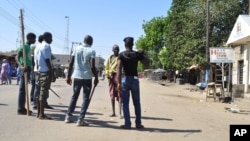Boko Haram’s siege on the border town of Damasak in Borno state last week was similar to many of the attacks the insurgent group has carried out in its five-year violent campaign for control of Nigeria’s northeast.
Mamadou Guide, an official with the United Nations High Commissioner for Refugees in neighboring Niger, said after the attack villagers fled across the border to Niger, where they sought refuge in the Diffa region, which has seen a large influx of Nigerian refugees.
The U.N. said 50 people were killed, some of whom drowned while trying to flee across a river.
But Damasak wasn’t targeted randomly and the goal wasn’t just to use the town as a base or steal weapons, as Boko Haram has done in the past.
Revenge attack
Rather, people with knowledge of the attack suggest it was a revenge strike against the town’s young men who have been joining anti-Boko Haram vigilante groups.
Armed with clubs, machetes and good luck charms, vigilantes have joined with Nigeria’s military to help provide local security in small, isolated towns like Damasak.
A resident in Borno state’s capital, Maiduguri, who asked not to be named, said the vigilantes have been having some success against Boko Haram.
“Many people decided to be youth vigilantes to cover their areas, their surrounding areas from minor attacks by Boko Haram. When I said minor attack, I mean, three or four groups of Boko Haram can go either with their guns or knives to kill or abduct young men or women,” the resident said.
“So in such [a] situation, the youth vigilante group attacks maybe 10, 20 or 15 in their groups, guarding their surroundings, so whenever they see them, they can go up to them and capture them and kill them," the resident continued.
But these vigilantes don’t have the weaponry or the numbers to fight off a full-scale attack by the group, the resident said. When Boko Haram comes in force - riding in pickup trucks and armed with heavy weapons, as they did in Damasak - the vigilantes find themselves outgunned.
Fearful of vigilantes
Still, Boko Haram is afraid of these vigilante groups, the resident said. The local men know some of the insurgents personally and would be able to identify them to security forces. For Boko Haram to operate freely, “they must be sure they overcome those vigilante groups,” the resident said.
Bawa Abdullahi Wase, a security analyst and associate at the Nigeria-based Network for Justice, said Boko Haram’s targeting of Damasak shows the group recognizes the vigilante forces may be one of the biggest threats it faces.
Local vigilantes are fighting to protect their families and homes, and to earn a living, Wase said.
Monday's attack on a university in Damaturu, the capital of neighboring Yobe state, shows Boko Haram is targeting young people who could join the vigilante movement, he said.
“They want to disperse the youth. They don’t want the concentrations of the youth, so that they don’t allow them any reason to generate thoughtfulness of counterinsurgency,” Wase said. “They don’t want the youth to also be stable, to have the idea of what next to do to [defend] themselves, their parents and their places.”
Nigeria's military has gained and lost ground against the insurgents in the northeast. But Wase said youth are always around, making vigilante groups an enduring force against Boko Haram.




